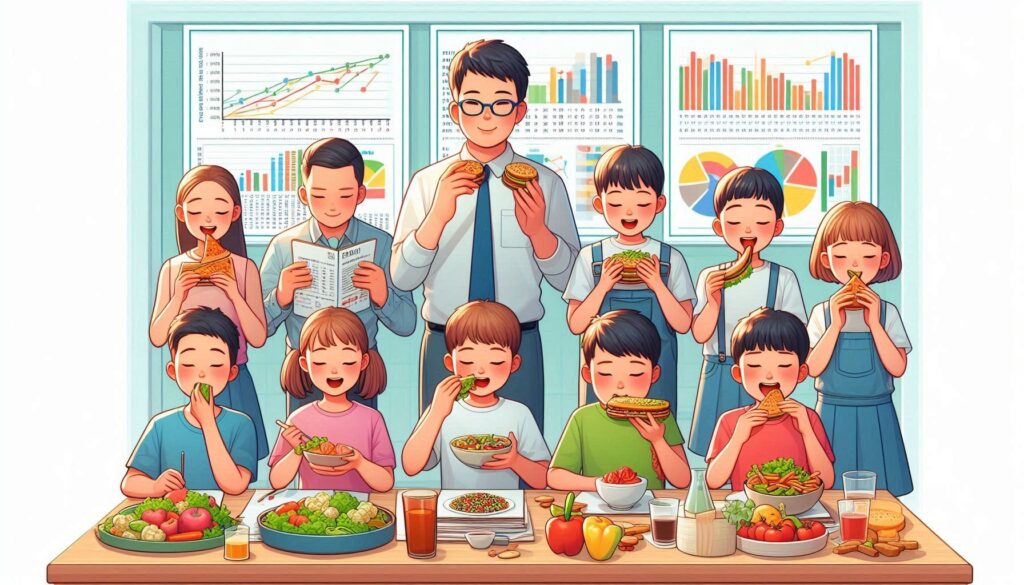
飲食和學生在校成績是有關係的!!
父母對於孩子們在校學習狀況和成績表現都非常重視,不過可能沒有注意到孩子們在校的成績與表現,和飲食大有關係。
我曾經指導博士班學生以台灣小學生的資料,來研析這個問題,探討兒童的飲食型態與整體學業表現之間的關係,發現了一些相當重要的結果,這篇文章已經在2007年就發表於美國營養師學會雜誌。飲食的影響範圍超乎想像,在這裡推廣一下。
由2001-2002年的小學兒童國民營養健康狀況調查,我們獲得了2222名小學生提供的完整的人口統計、人體測量、飲食和生活方式以及老師評出的整體在校表現分數。分析發現,台灣小學生中有7.1%的孩子學業表現不理想,這些學生不理想的學業表現與不健康的飲食習慣之間存在著明顯的正相關。
我們是將各種飲食項目歸類成為22小類食物,並由資料採礦法,找到五個飲食因素,其中三個因素和在校表現有關。(1)高糖分和油炸食物吃的多的表現較差,(2)奶類喝的多得表現較好,(3)高營養密度食物(如:蔬菜、水果、肉類、魚類和雞蛋)。也就是說:小學生多吃各種高密度食物,包括:蔬菜、水果、像肉類、魚類、雞蛋這些好蛋白質食物,以及高鈣的奶類者,在校整體表現較佳;愛吃也多吃各種含糖高油零食的學生則表現較差。更重要的是,3項都不佳的表現最差,2項不佳的次之,1項不佳的更次之。
總之,這項研究顯示,表現不佳的學生更傾向於食用糖果和油炸食品,而不太傾向於攝取富含蛋白質、維生素和礦物質的食物。這一發現提醒我們不可輕忽學童飲食,要重視正餐的內容。父母親需要增加自己對飲食營養的知識,並且用心於全家人的飲食健康。拿錢給孩子隨便買早點、零食,自購中餐、晚餐,雖然方便,可能會影響學童生理健康以及學習能力。
參考文獻
Fu ML, Cheng L, Tu SH, Pan WH. Association between unhealthful eating patterns and unfavorable overall school performance in children. J Am Diet Assoc. 2007 Nov;107(11):1935-43. doi: 10.1016/j.jada.2007.08.010. PMID: 17964314.
The Relationship Between Diet and Academic Performance in Students
Parents often place great importance on their children’s academic performance, but they may not be aware of the significant impact that diet can have on students’ results. I previously guided doctoral students in analyzing data from Taiwanese elementary school students to explore the relationship between children’s dietary patterns and overall academic performance. The findings, published in a 2007 article in the Journal of the American Dietetic Association, revealed crucial insights into the influence of diet.
Using data from the 2001-2002 National Nutrition and Health Survey for Elementary School Children in Taiwan, we obtained comprehensive information from 2,222 students, including demographics, physical measurements, dietary habits, lifestyle, and teachers’ ratings of overall in-school performance. Analysis indicated that 7.1% of Taiwanese elementary school students had suboptimal academic performance, and there was a clear positive correlation between poor academic performance and unhealthy dietary habits.
We categorized various food items into 22 subgroups and employed data mining techniques to identify five dietary factors. Three of these factors were associated with in-school performance: (1) poor performance correlated with high consumption of sugary and fried foods, (2) better performance was linked to increased consumption of dairy products, and (3) optimal performance was associated with a diet rich in nutrient-dense foods such as vegetables, fruits, meats, fish, and eggs.
In summary, the study showed that students with poor academic performance tended to consume more sweets and fried foods, while those with better performance favored a diet abundant in proteins, vitamins, and minerals. This underscores the importance of not overlooking children’s dietary habits and emphasizes the need for parents to enhance their nutritional knowledge and prioritize the content of regular meals. Providing money for children to buy snacks and meals without guidance may be convenient but could potentially impact both their physical health and learning abilities.
References:
Fu ML, Cheng L, Tu SH, Pan WH. Association between unhealthful eating patterns and unfavorable overall school performance in children. J Am Diet Assoc. 2007 Nov;107(11):1935-43. doi: 10.1016/j.jada.2007.08.010. PMID: 17964314.
原文來自Facebook潘文涵教授/營養師的老師:飲食和學生在校成績是有關係的!!
